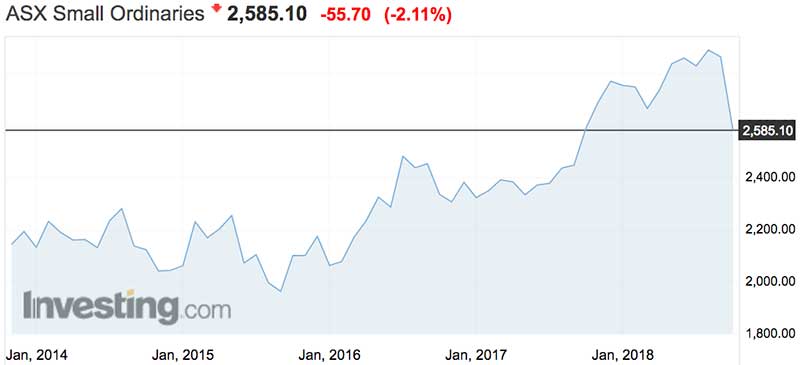The ASX Small Ords loses all its gains from the past year amid market slump
News
News
The ASX was hit by a wave of selling from Wall Street today — and small caps were not immune.
The ASX200 fell into correction territory — dropping 2.8 per cent to 5664.1. That’s down more than 11 per cent since the end of August. A correction is a drop of at least 10 per cent.
The ASX Small Ords — a measure of small cap ASX stocks — is down almost 12 per cent in the same period.
The small cap index today fell 3 per cent or 78 points to 2562.7.
The ASX Small Ords is still out-performing the ASX200 and All Ords indicies over the past 12 months — but only just as the graph below shows.
Still, analysts told Stockhead the correction provided a buying opportunity — and a rebound in US markets on Friday morning seemed to back that up.
The Dow Jones was up 1.8 per cent at 6.30am AEST Friday after dropping 2.4 per cent on Thursday. The S&P 500 and NASDAQ indicies also looked like making up most of the ground they lost yesterday.
Compumedics (ASX:CMP) was among the big losers Thursday after its much ballyhooed deal to sell its “Somfit” sleep-tracking device into China got derailed.
The stock rocketed 75 per cent to 72c at the time of the announcement — but fell 18 per cent to 32c before closing at 34c.
“Compumedics wishes to advise shareholders that the contract negotiations in relation to its Somfit technology with leading China-based health-check organisation, Meinian Onehealth Healthcare … have stalled due to key issues remaining unresolved,” the group told investors.
Compumedics cited issues concerning intellectual property rights and “conflicts of interest with a third party introduced to the joint venture discussions”.

Elsewhere, Cobalt Blue (ASX:COB) plummeted after it told investors it would miss a deadline to take full ownership of its 70 per cent owned Thackaringa cobalt project.
Cobalt Blue dropped 27 per cent to 22c on the news. Its joint venture partner Broken Hill Holdings (ASX:BPL) suffered an 8 per cent dip to 4.6c.
Among the large caps, the big four banks had lost almost 2 per cent by 11am AEST Thursday.
AMP dropped more than 4% to $3.17 as it announced the sale of its life insurance business.
BHP was down 3% to $31.10 and Fortescue Metals 3.3% to $43.73.
Qantas fell 3.6% to $5.415 despite announcing a record revenue first quarter.
Wall Street plunge
The sell-off was prompted by a Wall Street plunge early Thursday morning — wiping out gains for the year, as the corporate earnings season failed to calm nerves about rising rates and the prospect of slowing global economic growth worldwide.
Before Friday’s recovery, the S&P500 fell 3.1%, the Dow Jones 2.4% and the tech-heavy Nasdaq 4.4%.
Nick Twidale, Rakuten Securities Australia’s COO, says the same combination of global geo-political and trade risks continues to weigh on markets and the earnings season keeps producing mixed results with the downside surprises superseding the positives in the current environment.
“There was no real fresh catalyst for yesterday’s moves, but investor confidence is hitting lower levels and with no real new positive news, the downside trend continued. Haven assets gained across the board with the Dollar and Yen both having strong days,” he says.
“The exception to the usual rule was the Loonie which had a sharp topside correction after the Bank of Canada raised rates as expected and then delivered a more hawkish outlook.”

Jonathen Chan at CMC Markets says the stock rout in the US could be distressing to global investors, however a sharply lowered US bond yield may be beneficial to the bigger picture in the long run.
The US 10 year bond yield fell sharply overnight to around 3.10% compared to the recent peak at 3.248%.
“A temporary relieve from a higher borrowing cost could allow investors to reposition in the financial markets with fewer tensions,” he says.
“Investor sentiment may be vulnerable in the short run but a correction could also mean a chance to start afresh.”
This article features content from an article that first appeared on Business Insider Australia, Australia’s most popular business news website. Read the original article. Follow Business Insider on Facebook or Twitter.